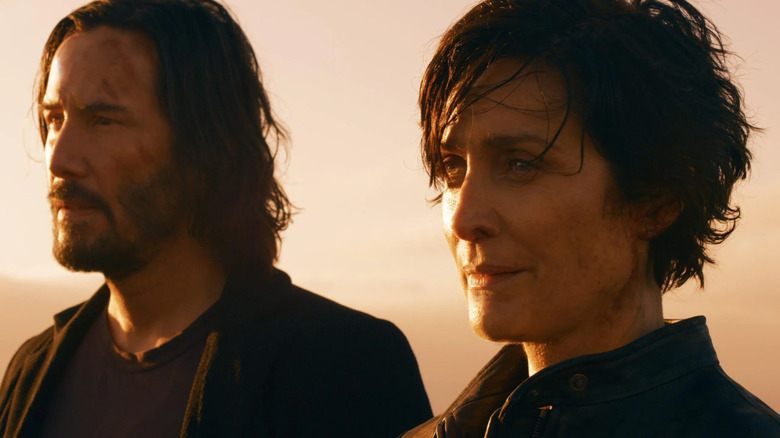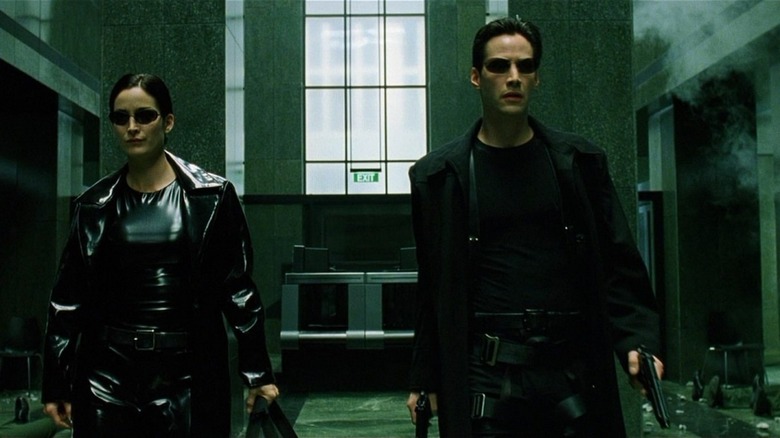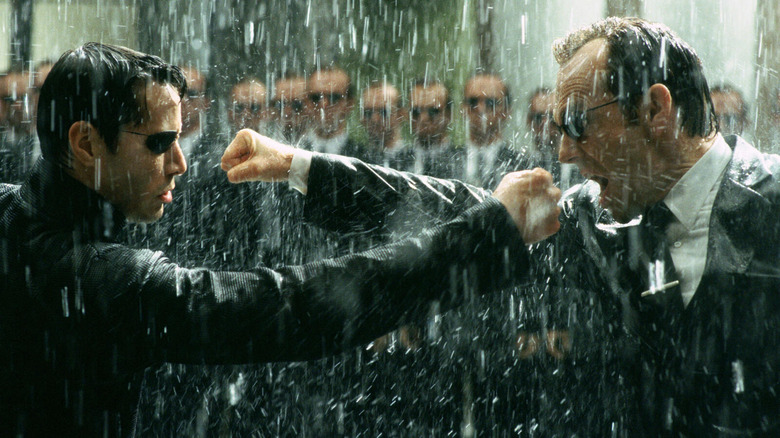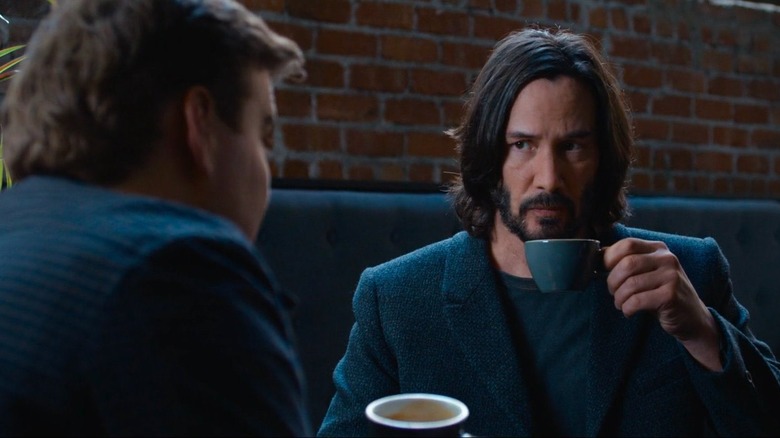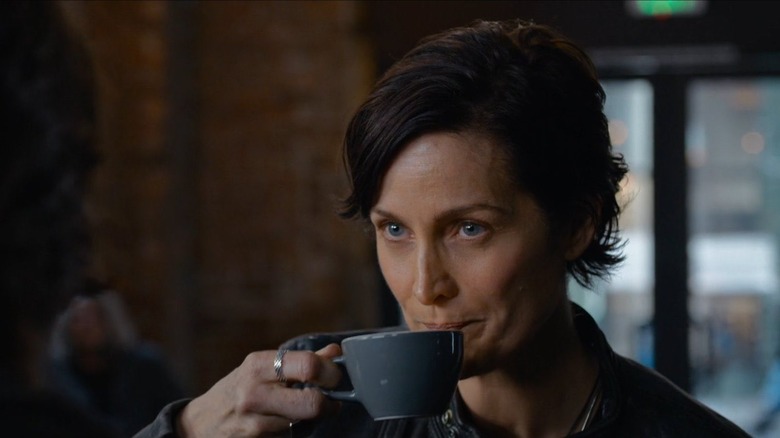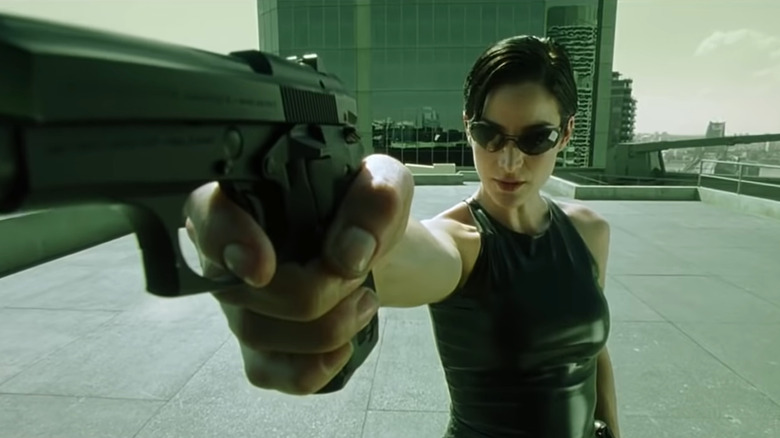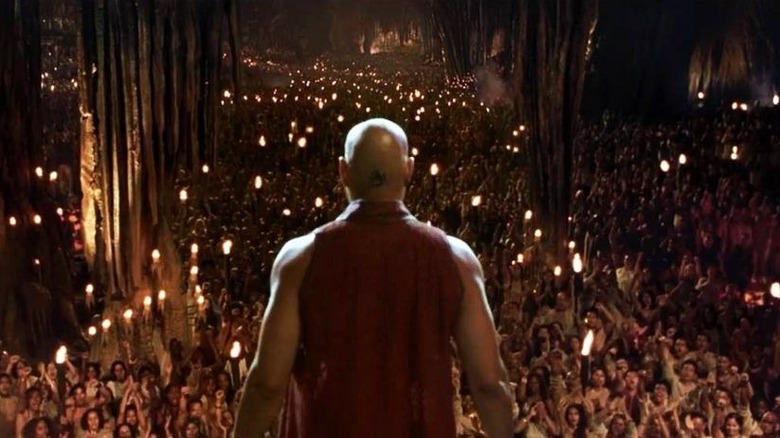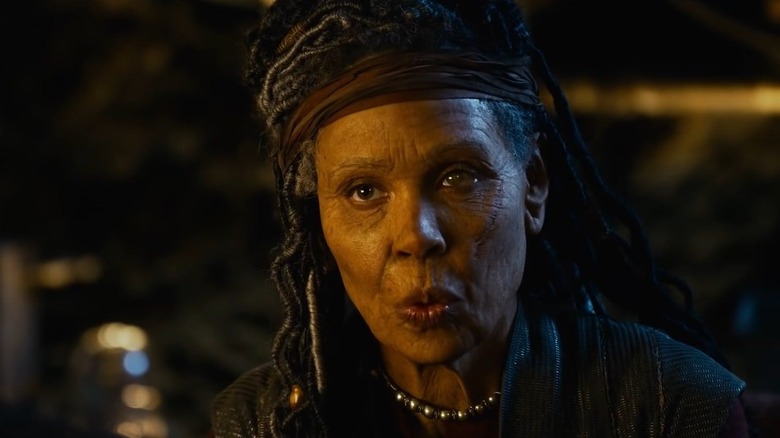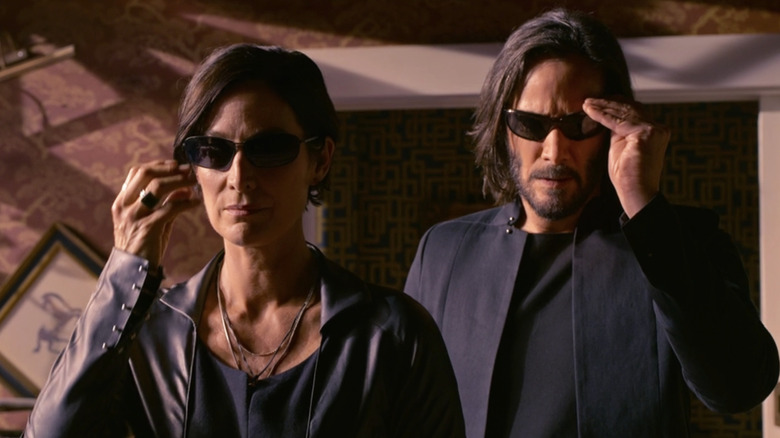The Matrix Resurrections Is The Series Conclusion The Matrix Revolutions Could Never Be
In December of 2021, "The Matrix: Resurrections" was released to mixed reactions. Depending on who you ask, the fourth movie was an unnecessary, cynical cash-grab, or a beautiful, necessary conclusion to the franchise. The sequel either stomped on everything that made the original movies so great, or it was a thoughtful love letter to the fans.
When it comes to whether you'll like this latest installment or not, the biggest predictor is how invested you already are in the romance between Neo (Keanu Reeves) and Trinity (Carrie-Anne Moss). To some fans, their relationship was just a subplot in the original trilogy, something to sit through between the cool action sequences that made the movies so widely known. To other fans, their relationship was the heart of those movies. Their love, and the unselfconsciously earnest way in which it was depicted, was part of why we enjoyed the Matrix trilogy as much as we did, even if the first two sequels weren't quite on the same level as the original.
To the latter group, "Resurrections" works so well not just because it zeroes in on Neo and Trinity, putting more work into exploring and defining their relationship than ever before, but because it serves as the third climactic, emotionally satisfying installment of the real Matrix trilogy.
Yes, a 4-part trilogy
Although the idea of "Resurrections" being the final entry of a trilogy doesn't make sense on the surface, it's the best way of looking at not just that movie, but the entire franchise. Looked at as a whole from 1999 to 2021, "The Matrix" franchise is a three-act story about two strangers who meet and fall in love in act one ("The Matrix"), find themselves separated, seemingly forever, in act two ("Reloaded/Revolutions"), and who manage to defy the odds and reunite in act three ("Resurrections"). It all fits together when you remember that the two original sequels were basically one big movie.
Not only were "Reloaded" and "Revolutions" filmed back-to-back but they were released within an unusually close six months of each other. Even the "Pirates of the Caribbean" sequels, filmed back-to-back a few years later, were released nearly a year apart. Even though the six-month gap was unprecedently close for modern blockbusters, it was still a compromise from what the Wachowskis originally wanted, which was to have "Reloaded" and "Revolutions" released within two to three months of each other. This makes sense because, in every way other than the literal sense, these aren't two separate movies. This is one five-hour movie split in two.
This is why, although they still have plenty of other flaws, these two sequels work better when you watch them with that mindset. The lack of time spent within the Matrix in "Revolutions" is less disappointing when you've just sat through the countless physics-bending actions scenes of "Reloaded." The long-winded first act of "Reloaded" is much more forgivable when you know all this exposition is setting up five hours of story, not two and a half. Thematic details, like Morpheus being dead wrong about the machines reaching Zion, only really have an impact if you're watching "Revolutions" with the previous movie fresh in your mind.
Seeing Revolutions as the end of act two
One of the biggest complaints levied at "Matrix Revolutions" is that it doesn't work as a climactic final entry to the series. It ends not with the machines being defeated, but with Trinity dying and Neo sacrificing himself to the machines in order to forge an uneasy ceasefire. The machines are still mostly in control, and all our main characters are either dead or suffering major personal losses.
When looking at other famous trilogies for comparison, "Revolutions" feels tonally more similar to the middle entries. Just as Han Solo was separated from his love interest and captured by enemies to an as-yet-uncertain fate in "The Empire Strikes Back," so was Neo here. Just as Batman stopped the Joker but only with the devastating losses of Harvey, Rachel, and his reputation in "The Dark Knight," Neo only stops the machines from killing everyone after losing Trinity and (presumably) his own life. Jack Sparrow embracing his death at the hands of Davy Jones' Kraken at the end of "Dead Man's Chest" hits similar narrative beats as Neo letting Agent Smith take over his body.
The difference was that those films all had a follow-up movie promising some kind of closure to these characters; audiences knew that Han could still be saved, that Batman would probably get a happier ending in the next film, that Jack wasn't going to be dead forever. "Revolutions" didn't have any of that. According to everyone involved in the production, this was supposed to be a conclusive end to the series, but it didn't really feel conclusive.
The film attempts to work as a trilogy capper by letting the Zion characters cheer over the end of the battle, and having the Oracle share some uplifting words at the end, but at its core, "Revolutions" is a downer. Looking at these movies through the lens of a love story between Neo and Trinity, "Revolutions" is a clear act two low-point.
Resurrections as act three
Perhaps one of the best explainers for what to expect in the third movie of a trilogy comes from "Scream 3," where film buff Randy Meekins explains to Sidney (Neve Campbell) what to expect as she's hunted by a third round of killers: "True trilogies are all about going back to the beginning and discovering something that wasn't true from the get-go." Even if they don't pull anything on the level of the "Leia's your sister" reveal, the third entry in a trilogy always returns in some way to the first movie.
"The Dark Knight Rises" lets its main villain be the daughter of the villain from "Batman Begins," just as "At World's End" allows the villain from "Curse of the Black Pearl" to help the main heroes along. "Revolutions," meanwhile, doesn't really have that feeling of being a return to the original. There's the recentering of Agent Smith as the primary villain, but that doesn't feel like a proper return to the beginning because Smith was also a constant presence in "Reloaded." In fact, with the heavy focus on Zion and the lack of a full storyline for Morpheus, if anything, "Revolutions" feels like the series is straying further and further away from its starting point.
The true return to the beginning happens in "Resurrections," a movie that's obsessed with re-examining the series' roots. The first third of the film is essentially a remix of the original movie, showing us the same scenes but with different contexts. When Neo first talks to Trinity in "The Matrix," Trinity comes across as mysterious and a little dangerous, knowing much more about Neo than he knows about her. When the two first meet in "Resurrections," she's still a cool, self-assured person, but she's just as clueless about her situation as he is. Whereas their meeting in "The Matrix" evokes a sense of excitement for what's to come, their meet-cute moments in "Resurrections" make us long for a return to who they used to be. We know how badass these characters were, and on some level, they seem to know it too.
What happened to the cool action scenes?
One of the best takes on "Resurrections" when it first came out was from director Adam Mortimer, when addressing the major fan complaint that the fourth movie lacked the memorable action scenes and aesthetic style of the original three movies:
The element that really got me was how courageously Lana W — famously an absolute innovator of film aesthetics — deliberately chose an anti-aesthetic to critique the modern world and to focus on intense emotion ... You can see the binary at work looking at two scenes: the coffee shop sit down chat with Tom & Tiff, and the Tokyo train fight. The latter is weirdly lackluster, for the franchise, and the former is riveting & electric, for the GENRE — the action in this movie is human connection
Critics are right in that "Resurrections" doesn't have any action scenes on the same level as, say, the highway chase sequence in "Reloaded." Even the motorcycle chase sequence near the end, while not boring or incompetently filmed, doesn't have the same rewatchable thrill factor that we're used to from a Matrix film. The exciting scenes from this movie, the ones I keep coming back to rewatch, are scenes like when Neo (thinking he's Tom) tries to make sense of his supposed panic attacks, or where Trinity (thinking she's Tiffany) talks about the strange way the Matrix videogames make her feel. Whereas the most visually satisfying moment from "The Matrix" for me is Trinity's "dodge this" line, the coolest moment in "Resurrections" comes when Trinity finally remembers who she is.
'The action in this movie is the human connection'
In that scene, Neo is trying to get Trinity to understand that her life isn't real, that she's been brainwashed into thinking she's a regular mom with a loving husband and two kids. He wants her to reject the reality she thinks she's been living in this whole time. She reluctantly says no, that it's too late, and Neo has no choice but to accept her decision, even if it means losing her forever.
For a moment it looks like it's all over, but as the FBI officers swarm around Neo, and Tiffany's being led out of the store by her increasingly impatient husband, she stops. Her fake husband yells "Tiffany!" at her and suddenly, just like with the "dodge this" scene from the first movie, the background music cuts off. "I wish you would f***ing stop calling me that. I hate that name." She turns and looks him right in the eye and says, "My name is Trinity, and you better get your hands off me."
It's not as surface-level cool as that scene on the rooftop in "The Matrix," but these scenes both hit the same beats. Both center around Neo being trapped in an impossible-looking situation, with the suspense being dragged out just long enough for viewers to think that maybe this really is the end of things, only for Trinity to unexpectedly save the day in a surprising, sudden manner. They're both incredibly cathartic (in my theatre on opening night, people cheered) and they both serve to establish the two characters as an unstoppable duo.
The difference is that this time around, the satisfaction doesn't come from Trinity pointing a gun at a cool camera angle; it comes from the relief of her remembering who she is, at her love for Neo, and her confidence in herself returning in a single climactic surge of adrenaline. Her telling her fake chad husband to get his hands off of her is this movie's equivalent to her shooting an agent in the face in slow motion.
Confirming the core of the franchise
As much as the main characters could sometimes come across as cold and emotionless in the original movies, what with their sunglasses and their stoic facial expressions, the fans and critics behind the negative reception of "Resurrections" seemed to forget that these movies were always goofy and sappy as hell, and that was part of their charm. Even the universally beloved first movie centers its climax around Neo being brought back to life by a true love's kiss. It's silly and doesn't make logical sense, but it's okay because of how sincerely the movie treats it. It's a series that's unironically about how love conquers all, and it's been that way from the very beginning.
When the Wachowskis included the rave montage in "Reloaded," it was widely mocked and criticized at the time (and in the years since) for supposedly being pointless, weird, and way too long, but it's one of the most important scenes in the franchise. It is a weird scene, but it's also a celebration of what makes these characters human and what differentiates them from the machines they're fighting against. As much as the machines may have physical and technical dominance over the humans, it's their inability to fully understand and predict the complexity and intensity of human emotions that allows the humans to win in the end.
The Matrix franchise has always been kind of gooey and romantic, but that aspect was understated and easy to ignore under the several layers of cool leather suits and badass action scenes. "Resurrections" flips things around, letting the action scenes be understated and the emotions be the main focus. In flipping that dynamic in "Resurrections," by turning the passionate scenes between Neo/Tom and Trinity/Tiffany into the most exciting, intense part of the film, it feels like a bold declaration from Lana Wachowski about what this series has always been about. Bullet time is cool, sure, but the entire series is a love story first.
Here, the past matters
It's this continued exploration of its core themes that separate "Resurrections" from "The Force Awakens," another sequel of a franchise that went on a significant break. In particular, "Resurrections" avoids one central pitfall the "Star Wars" sequels fell into: here, everything that happened in the original trilogy actually mattered.
At the end of "Return of the Jedi," the empire is defeated and presumably, our heroes are going to work to establish a better world order, one where the Sith aren't ruling the whole galaxy. The "Star Wars" sequels, in their quest to hit the same narrative beats as the original, erases any of the impact the original rebellion ended up having. Turns out the rebels weren't very good leaders, because it only took about thirty years for the galaxy to be ruled by yet another massive evil Sith organization, and now they're right back to where they started. In the sequels' attempts to recapture the magic of the originals, they ended up undermining so much of the original trilogy's conclusion.
Meanwhile, Neo's sacrifice in "Revolutions," as shaky as it may have seemed at the time, legitimately did bring about sixty years of relative peace. Instead of centering the story around a new generation of young fighters and having the original characters serve as fan-servicey cameos, Lana Wachowski chose to keep Neo and Trinity at the center of our attention. Their history weighs heavily on the audience's minds, even as they themselves don't remember it.
Instead of attempting a requel (not quite a reboot, not quiet a sequel, written with the intent of making more sequels down the line), "Resurrections" was written with no sequel in mind. Its focus is entirely on answering questions raised from the ending of the last movie and providing closure to Neo and Trinity's storyline. It's a concluding chapter, not a new beginning.
The grace in letting things end
"Resurrections" understands more than any other movie of a major franchise that making sequels indefinitely just means forbidding the main characters from finding real, lasting happiness. We saw this in "Star Wars," where Luke, Leia, and Han are denied the happy ending "Jedi" implied for them, and we see it constantly in the "Scream" franchise, where the writers seem painfully aware of how every new movie means Sidney's going to have her whole life upended yet again.
There's a meta line near the beginning where Neo's told that Warner Bros. is forcing them to make a sequel to the Matrix trilogy ("They informed me they're gonna do it with or without us"), and people interpreted it as Lana Wachowski giving a middle finger to the studio, but the real middle finger to Warner Bros. was when the movie wrapped up with a clear-cut happy ending.
Neo and Trinity have not only reunited, but they've won. They have complete control over the Matrix and the Analyst can't stop them. This storytelling choice pre-emptively kills the chances of another "Matrix" sequel because to make a new movie would be to completely undermine everything that happened here. In an entertainment landscape where every big movie seems designed to contribute to some kind of larger extended universe, Lana Wachowski only focused on telling the story she wanted to tell.
Even though this movie was never part of the original plan for the franchise, looking back at the series as a whole, it feels like a necessary installment, almost inevitable in a way. As much as they may have intended for "Revolutions" to be the end of the series, it simply didn't work as a conclusion, and that movie's retroactively improved now that we know it wasn't the end. Critics may have complained that "Resurrections" has no reason to exist beyond making the studio more money, but the movie gives us a pretty clear explanation: Neo and Trinity deserved a better ending than what they initially got, and this movie gives one to us.
